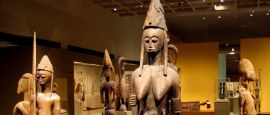Ivory Coast History, Language and Culture
History of Ivory Coast
During Medieval times, the region that is now Côte d'Ivoire was at the centre of several major African trade routes, linking empires in Ghana and Mali. Malinke merchants brought Islam to the region.
European traders had been present since the 15th century, but it was not until the 19th that the French undertook a determined penetration of the region. Côte d'Ivoire was incorporated into French West Africa until it was granted independence in 1960.
At independence, Félix Houphouët-Boigny became president, an eccentric and effective politician who dominated political life for the next 33 years through the Democratic Party of Côte d'Ivoire (PDCI). He died in December 1993 and was replaced by Henri Konan Bédié.
Victory at the 1995 presidential poll, and for the PDCI at the parliamentary elections, pointed to a seamless succession. However, problems began with serious industrial unrest and the highly unpopular military intervention in the Liberian civil war.
Nevertheless, a military coup in December 1999, organised by General Robert Gueï, was unexpected. An ex-minister loosely allied to Ouatarra, Gueï established a new military regime. Presidential elections were held in October 2000; the principal contenders were Gueï and Laurent Gbagbo, standing for the Ivorian Popular Front, whose main constituency is among Christians in the south.
When Gueï tried to manipulate the result, he was driven into exile (where he died), leaving Gbagbo as the winner. The Rally of the Republicans (RDR) candidate, Ouattara, had been blocked from standing in the election, infuriating northern Muslims and sparking unrest.
A new government, in which Ouattara's RDR was given four ministerial posts, was set up in 2002. However, fighting broke out between pro-government forces and dissident army units, and continued until 2004 with the country divided between the rebel-held north and a government-held south. In 2007 the two sides agreed to elections, but they were not held until 2010.
Both Gbagbo and Ouattara claimed victory in the 2010 elections leading to violence. Gbagbo was eventually arrested and handed over to the International Criminal Court where he is being tried for triggering political unrest. Ouattara became president and has since been re-elected in a peaceful election in 2015.
Did you know?
• Ivory Coast is the world’s largest cocoa producer.
• The Basilica of Our Lady of Peace in Yamoussoukro is the largest church in the world.
• The official language of Ivory Coast is French, but it is estimated that 65 languages are spoken in the country.




 You know where
You know where